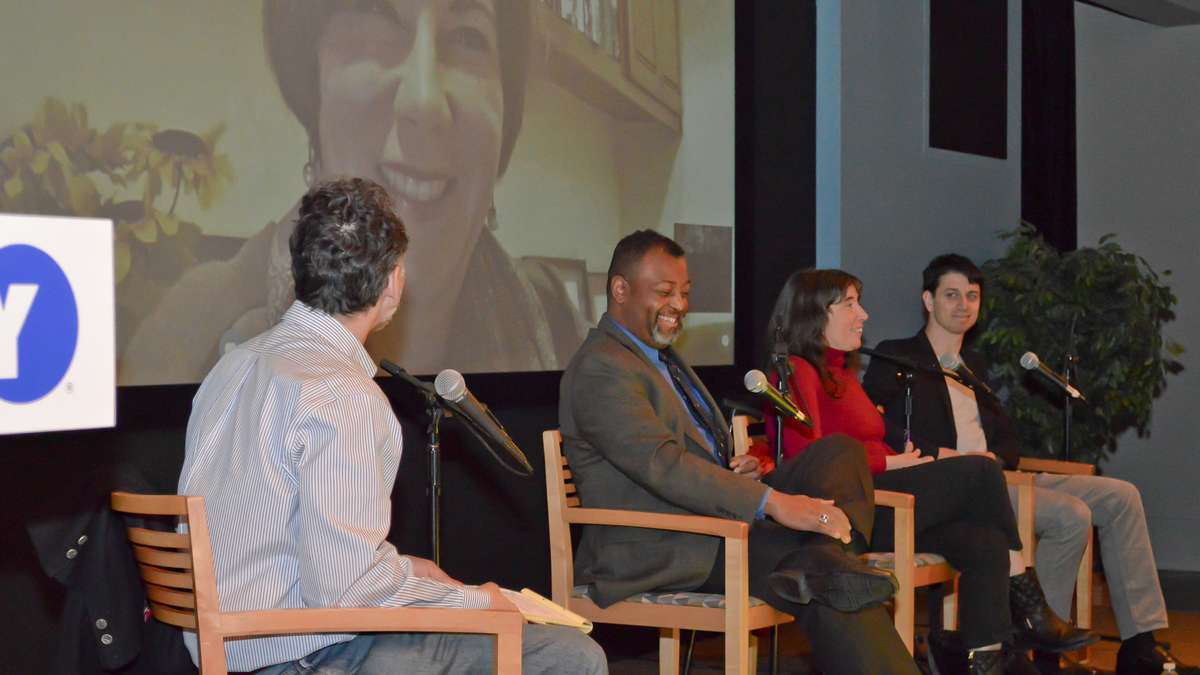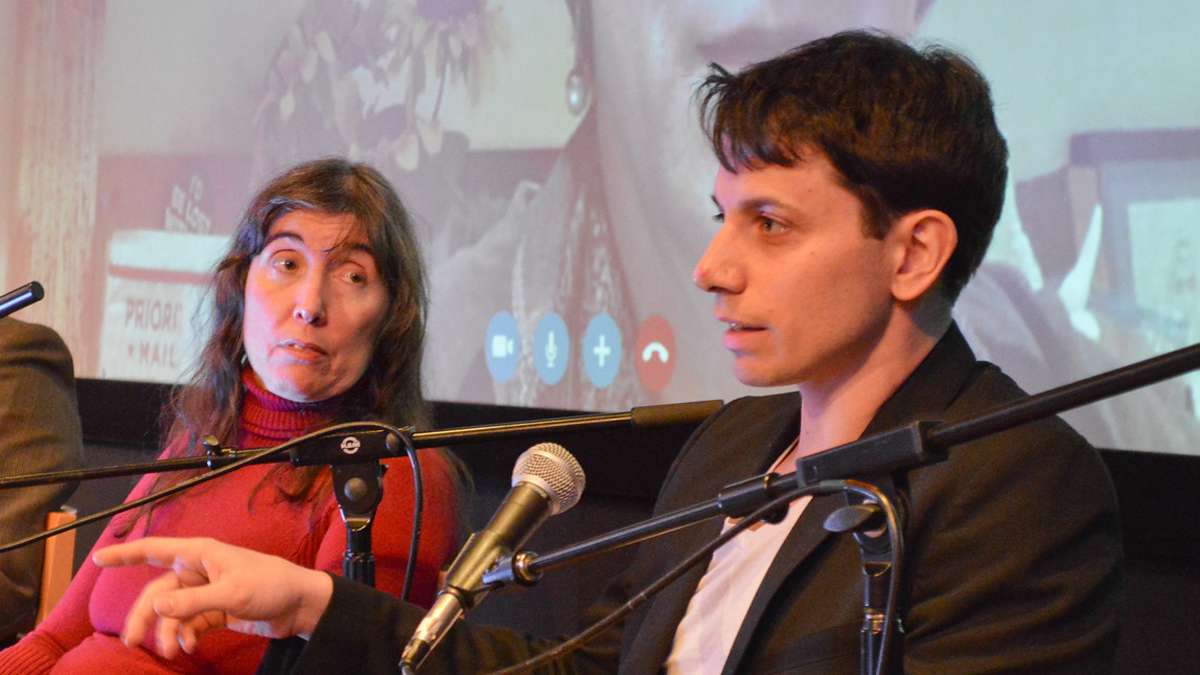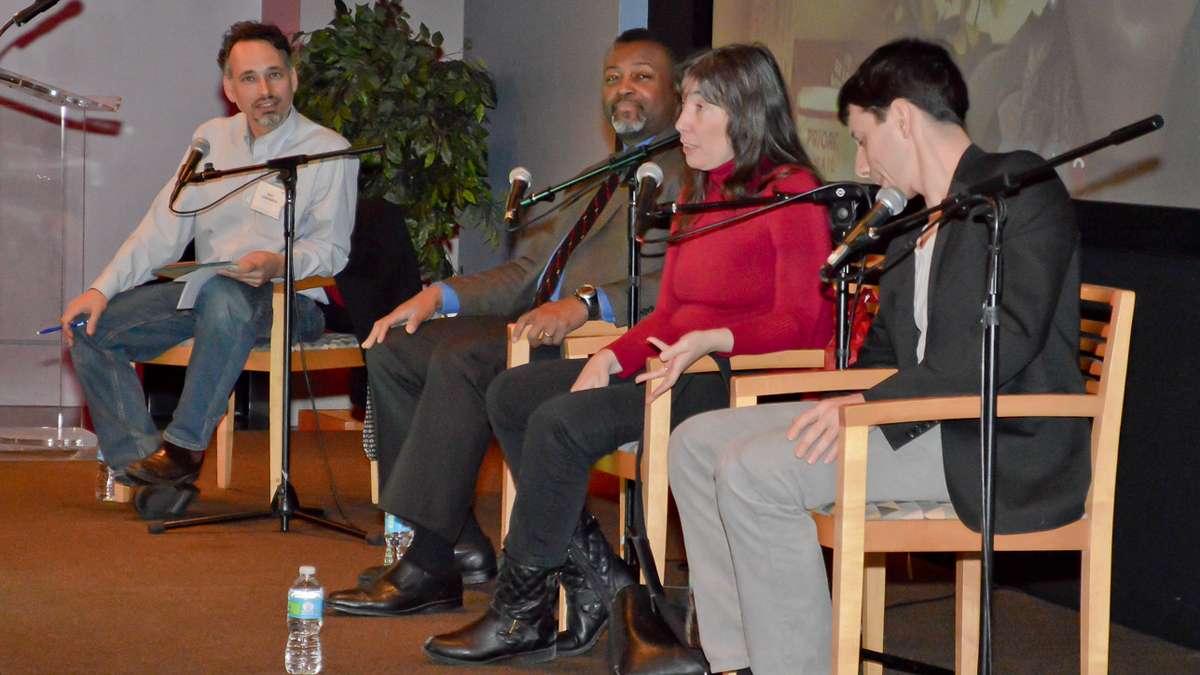Hundreds gather to discuss Bergdahl case, ‘Serial,’ and our proxy war
It’s hard to know if the second season of “Serial” has been able to capture the same level of enthusiasm as the first, or if Americans are just anxious to talk about the war in Afghanistan, but WHYY drew a standing-room audience to its studios on Tuesday for a happy hour panel discussion about the podcast.
Sarah Koenig and team this time are focusing on the story of Bowe Bergdahl, the American soldier who was captured by the Taliban and held for five years after he walked off of his base in Afghanistan in 2009.
Panelist Josh Fattal said that Americans’ attitudes toward Bergdahl have become a proxy for what we think of the Afghan War. “This is a very sketchy war that no one is still speaking out against,” said Fattal, the Cheltenham native who was captured and held for more than two years by the Iranian government after he and two friends crossed into Iran while hiking in Iraqi Kurdistan in 2009.
Bergdahl’s story, like his own, is captivating the American public, he said, not just because of what happens “over there,” but because it’s teaching us about how we are treating Muslims as our bogeyman.
Fattal said he could relate to a lot of what Bergdahl experienced: being a political prisoner, being a hostage, being traumatized, and then trying to recall all of it after returning home. He can also relate to being used as a political pawn. “My words were used by every shade of the political spectrum for every shade of political purpose,” hs said. “And Bowe is in the same position but with higher stakes.”
Bergdahl is in the midst of court martial proceedings, having been charged with desertion and misbehavior before the enemy, and faces the possibility of life imprisonment.
Panelist Rachel VanLandingham, a military law expert and retired Air Force lieutenant colonel, casted doubt on whether Bergdahl should have been court martialed at all. Skyping in to the panel from her home in Los Angeles, she lauded “Serial,” saying it has “done a tremendous job of allowing us to see what the Army is not allowing us to see,” by incorporating so much of Bergdahl’s interviews with journalist and filmmaker Mark Boal. As the vice president of the National Institute of Military Justice, she is particularly concerned about the U.S. Army’s lack of transparency with its investigation.
Philadelphia journalist Chris Lombardi, in the course of writing a book about dissent and desertion, did some of the same research on Bowe Bergdahl as “Serial” host Sarah Koenig. She says that while it doesn’t look to her like Bergdahl was acting like a deserter, it has been difficult to put the pieces together to learn what the whole truth is.
At one point, Fattal said that it’s important to remember that we’re dealing with CIA-censored testimony from Bergdahl, through Boal, who’s working closely with CIA, through ‘Serial,’ through our own interpretation.
Panelist Malcolm Nance, a Navy veteran who trains military and intelligence officers to resist captivity and interrogation, and to manage torture, said that, by all accounts, Bergdahl behaved honorably after capture. “He is going to get his POW medal,” Nance concluded. “He deserves it.”
Desertion and misbehavior
VanLandingham was able to clarify the nature of his case when moderator NPR veteran affairs correspondent Quil Lawrence asked what Bergdahl has admitted to doing wrong, and what he has done right.
Through the podcast and Bergdahl’s own words, we know that he has admitted to intentionally leaving his post of his own volition. He has been charged with desertion with the intent to shirk his duties. She later clarified that this is different from how the layperson may colloquially understand desertion: He has not been charged with leaving his post with the intention of never returning.
He has also been charged with misbehavior before the enemy, thereby putting his unit at risk. She said there have been no cases of misbehavior before the enemy in recent history. And while it is difficult to know at this moment what exposure to risk his actions brought to his unit, there is no evidence that anyone was killed in their search for him.
(Episode 10 of Serial, released after this panel discussion, seems to cast doubt on this and hints at more evidence to come in episode 11.)
“Bergdahl knew that he had screwed up the very moment he was captured,” said Nance, which is why investigating officer, Gen. Kenneth Dahl, believed him.
Nance called Bergdahl’s attempts at escape “commendable” and said he was quite taken by the story of a soldier facing the enemy and adapting to capture without having the benefit of survival, evasion, resistance, and escape training.
Within the community of people who teach and uphold the code of conduct when facing the enemy, said Nance, it is understood that Bergdahl resisted to the utmost. “I could have taught him that,” he said. “He taught himself that.”
Guantanamo blowback
The Guantanamo Bay detention camp, which still holds 91 prisoners, casts a long shadow to this day. America’s treatment of detainees has a direct influence on how captured Americans such as Berdgahl and Fattal are treated. Fattal shared a surprising anecdote from his own detention in Iran. Guantanamo has such tremendous currency in the Middle East, he said, that once when he and his friends compared the beating of a fellow prisoner to conditions at Guantanamo, the beating stopped.
An attendee asked via Twitter whether letting go of five Taliban detainees at Guantanamo in exchange for Bergdahl was “worth it.”
“It’s all about perspective,” said Fattal in an email response later. “It was worth it for Bowe and family. That’s who I first think about. Obama tried to turn it for political purposes, and though it may have backfired domestically, it may have helped signal something productive internationally. In making this judgment, it is tied up to a judgment of this war. We must remember that the Taliban was one among many militant groups in Afghanistan, and they consist of people who were previously propped up by the U.S., and then attacked for the work of another organization, Al-Qaeda. Ultimately, when it comes down to it, I believe that the trade was worth it. I think Bowe’s voice needs to be heard — it still has yet to be! If we didn’t deem him worth it, he’d be dead and voiceless.”
On Tuesday night, Fattal said be believed Bergdahl was being used as a pawn when the Army was searching for him in Afghanistan — even though they knew he was probably in Pakistan. Why? It was part of the surge strategy that they would use him as a pretext for being in Afghanistan, he said.
Leniency for Bergdahl
Bergdahl says he left his base because of conditions there. A member of the audience asked if there has been any investigation into those conditions? And was his stunt walking off base better than other alternatives?
Nance responded first. Like every soldier in Afghanistan, he said, Bergdahl had a problem with his chain of command. “He thought he would be put in a position of harm if he didn’t do something,” Nance said. “He thought that he was going to have this ‘wrong’ righted by walking off base, going to a higher level of the chain of command and having a court martial or being brought up to where he could explain his actions to a higher level in the chain of command.”
It was a deluded rationale, said VanLandingham, who reminded the audience that Bergdahl had been brought into the Army after being discharged from the Coast Guard for his mental instability.
Bergdahl “wanted to prevent a greater harm from occurring by committing this crime, which is the lesser harm. It has to be a reasonable calculation, and based on interviews that the Serial podcast did, it seems rather remarkably clear that not only was that unreasonable, it was incredibly, incredibly deluded.”
He had other options that were more reasonable, she said, such as talking to the inspector general, a judge advocate general, or a chaplain.
An audience member asked VanLandingham if Bergdahl would get credit for the time he spent in captivity if he were to be sentenced.
It’s not a one-to-one trade, she answered. If they get to a sentencing phase, it will be taken into consideration, but he would not necessarily result in a direct reduction in his sentence.
Fair trial
VanLandingham has taken the Army to task for its lack of transparency in its prosecution. She also criticized what she characterized as inappropriate Congressional influence on the trial, questioning whether Gen. Robert Abrams would have decided to prosecute if Sen. John McCain hadn’t so publicly called for Bergdahl’s punishment. Abrams must go before the Senate Armed Services Committee, which McCain chairs, for his next assignment as a four-star general, so it’s hard to believe there was no bias in the decision.
Given the political climate, VanLandingham said she thinks it’s difficult, if not impossible, for Bergdahl to get a fair trial. Episode 10 of the podcast laments the politicization of Bergdahl’s story and asks if it could have gone another way. Indeed
When asked what be the most appropriate punishment for a deserter, panelist Lombardi reminded the audience that Bergdahl has not been proved to be a deserter. She said, in her opinion, he’s suffered enough.
She said that, though his story has become a stand-in for people’s concerns about the war, we should really understand it as a singular story. “But people are so hungry to talk about Afghanistan, that’s why it’s so compelling,” she said.
Nance said it could be summed up with a three-word motto: Return with honor. “And as far as I’m concerned, that is all he’s done. Give him whatever punishment you’re going to give him. Time served. Dismissed. Because he’s already served his time.”
VanLandingham largely agreed, saying that Berdgahl should never have been court martialed in the first place. It comes down to retribution, she said. “The army wants its pound of flesh. He gave that pound of flesh and more.”
WHYY is your source for fact-based, in-depth journalism and information. As a nonprofit organization, we rely on financial support from readers like you. Please give today.










